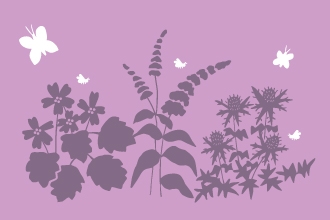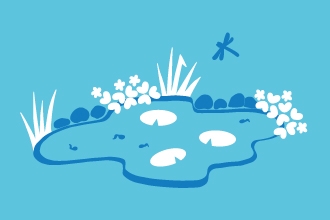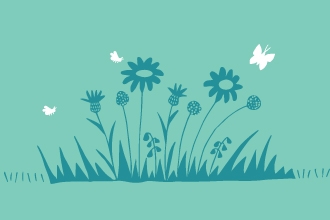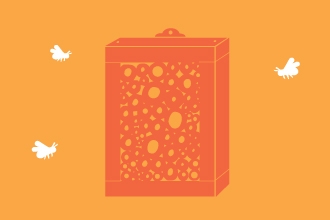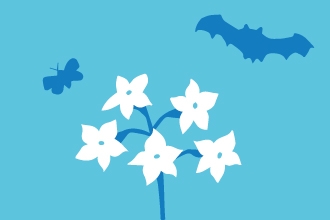Will you help the most important creatures on the planet?
41% of insect species face extinction.
The loss of their habitats and overuse of pesticides are two major reasons why these little creatures are dying out eight times faster than large mammals.
However, it’s not too late and with your help, we can put insects into recovery.
Claim your FREE Action for Insects guide and start to make a difference today.
By working together, we can change the future of insects. Starting right now, you can make small changes in your home, lifestyle and community that will help these fascinating creatures. Follow the advice in our Action for Insects guide and create an insect-friendly garden that is teaming with wildlife.
We are witnessing the largest extinction event on earth since the dinosaurs

Orange tip butterfly - Vicky Nall
How will your free Action for Insects guide help you make a difference?
Packed full of easy to follow advice and tips. Our Action for Insects guide will help you to:
· Create a wildlife and insect-friendly garden
· Plan your garden and choose the right plants
· Stop using harmful chemicals inside your home and in your garden
· Make lifestyle changes that will benefit insects
· Find out more interesting facts and information to help create a Wilder Somerset
Find out why insects are dying out at such an alarming rate - and how together, we can stop it.
The latest report by Professor Dave Goulson summaries some of the best available evidence of insect declines and proposes a comprehensive series of actions that can be taken at all levels of society to recover their diversity and abundance.
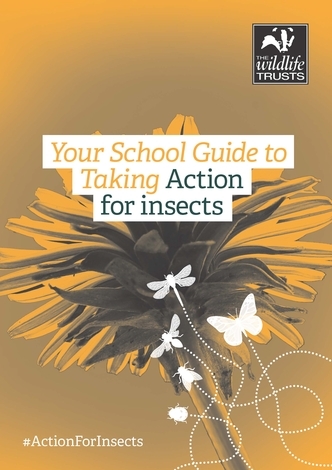
Our insects are in deep trouble. They're dying out up to 8 times faster than larger animals, and 41% of insects face extinction. But it's not too late! Our Action for Insects campaign has been created to help these special creatures, and we want schools to take part. That's why we've produced a school guide, full of lesson plans and resources to help your school to take action for insects.
Whether it's through a bug hunt, creating insect homes in your school grounds, or delivering a campaign to help insects, there are lots of ways that your school can make a difference and learn at the same time.
The Wildlife Trusts have published a new report ‘Reversing the Decline of Insects’ which shows how people, in every part of society, wherever they live, can take action to bring back insects. Everyone, everywhere, is being asked to become an insect champion.
The report cites examples of farmers, communities, councils and charities that are boosting insect populations and proving that it can be done.
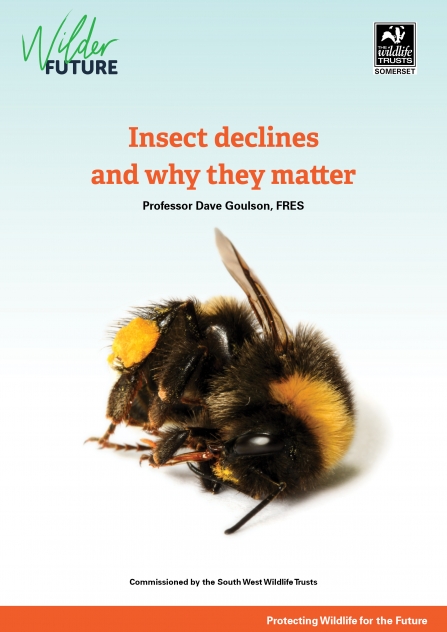
Front cover image: ©Michaela Neuner/Shutterstock.com
Read the landmark report by Professor Dave Goulson's - a wake up call for all of us to act now.
You can help by taking our pledge to take two simple actions in your home or outside space that will make a difference.
More actions you can take at home
There are plenty of ways you can help insects in your own garden. Check out our wildlife gardening web pages for more information here.
Want to install a pond, make a bug box or know the best plants for pollinators through the seasons? Find out more below.
Sign up today
Tell me more
The Wildlife Trust's position on pesticides and wildlife
Pesticides marketed as a quick-fix for a variety of industries and purposes are putting the nation on a route to certain long-term ecological disaster. A significant reduction in the use of pesticides, particularly insecticides, is the only possible option to reverse the decline and rebuild the very foundation upon which all life on earth depends. It is only by doing this that we can put in place a robust and future-proof ‘nature recovery network’ across the whole country that restores, connects and protects our wild spaces so our wildlife can move and their populations thrive long into the future.
It’s vital that our gardens, parks, urban areas and farmed countryside are managed in a more insect-friendly way. This includes a major reduction in the amount, type, and frequency of pesticides used to manage and look after these places. We are working with like-minded organisations to do this to identify new and realistic best practices, as we recognise that it will not be easy to make the transition from routine use, to routine avoidance of these harmful chemicals – whether at home in our gardens and allotments; in parks and other public green spaces including road verges; or on farms and woodland.
This is why, we urgently need the Government to establish stronger incentives for change and to set and enforce ambitious, national reduction targets for damaging pesticides. We need a systematic change in how we manage the wild places that our insects and invertebrates survival depends upon.
Don’t farmers need pesticides to grow enough food?
In many parts of Britain, traditional family farms have given way to large agri-businesses, typified by large fields, often managed by external contractors, maintained as near perfect monocultures by high inputs of pesticides and fertilizers.
The result is a landscape that produces more food, more cheaply, than it used to, but is largely inhospitable to wildlife and provides employment for very few people. The low price of food on the supermarket shelves that we have become used to does not reflect the true environmental costs of its production. It is also important to note that farmers only receive a fraction of the retail sale price of food, so the cost of improved on-farm practice would have a relatively small impact on shoppers.
Recent studies from France estimate that total pesticide use can be reduced by 42% without significant reductions to yield or profit
France is one of the biggest consumers of pesticides in Europe (per unit of agricultural area). In 2013, after controversy over levels of pesticide concentration in drinking water, the French government set a target of a 50% decrease in pesticide use, promoting the principles of agroecology and advocating integrated management of pests for a reduction of pesticide reliance.
Food security and economic impacts were a major consideration for policy advisors and researchers:
“We demonstrated that low pesticide use rarely decreases productivity and profitability in arable farms. We analysed the potential conflicts between pesticide use and productivity or profitability with data from 946 non-organic arable commercial farms showing contrasting levels of pesticide use and covering a wide range of production situations in France. We failed to detect any conflict between low pesticide use and both high productivity and high profitability in 77% of the farms.” Lechenet et al. 2017
How do I stop my plants and vegetables being eaten if I don’t use pesticides in my garden?
Gardening without chemicals is a good way to ensure that the food and plants you grow are free of pesticides or chemicals, thriving without the extra expense of dangerous products that are harmful to our wildlife. If you’ve used chemicals in the past, this might sound like an invitation to every pest for miles around to shred your garden ... and that might well happen at first. But, with time and patience, you’ll end up with a rewarding, healthier garden for ditching the chemicals.
Spraying to deal with pests can often kill the predators too, or at least make them want to avoid your garden. When you stop using chemicals, aphids are the first creatures to return as they have a short breeding cycle. Their predators may take longer to come back, but stick with it and know it will be better in the long run!
In the end you’ll wonder why you ever needed chemicals in the first place.
We can’t turn the clock back to how things used to be so what can we do today?
We can turn our cities, towns, villages and gardens into a buzzing network of insect-friendly habitats. We have about ½ million hectares of gardens in the UK, plus city parks and green spaces, school playing fields, railway embankments and cuttings, road verges and roundabouts; if managed favourably, and if we avoid pesticide use these areas could go a long way towards creating a national ‘Nature Recovery Network’.
250,000 miles of road verges. More could be managed for wildlife by sowing insect friendly seed mixes, mowing later in the year, and removing the cuttings. Green bridges should be a part of transport infrastructure projects.
430,000 hectares of gardens. Wildflowers in gardens have huge potential to help pollinators such as bees. A network of small patches could help bees thrive in urban areas.
52 million people. 80% of the UK’s population live in urban areas. New parks, street trees, green roofs and walls are an important way to help everyone experience nature in daily life.
Our public spaces. Two thirds of amenity land is short mown grass, but meadow habitats support eight times more wildlife. Just allowing more flower species in the grass, and mowing some areas less frequently has been shown to be of huge benefit to insects. Greener and more biodiverse neighbourhoods provide health and wellbeing benefits for people.
Our farmland. 70% of UK land is farmland, so making our farms more wildlife friendly and sustainable is vital.
What pressure is being put upon government to act?
The Wildlife Trusts and our Greener UK partners are campaigning for UK Government to pass new laws that will not only protect but will also help to restore green spaces and wild places.
We want a Nature Recovery Network enshrined in law to:
- protect existing wildlife sites and map out where wildlife ought to be, joining up important places for wildlife, while ensuring more people can live closer to nature
- Set targets for environmental improvement and nature’s recovery;
- Require plans to be produced to integrate national and local regulation, spending, investment and action.
You can find out more about our Wilder Future campaign here.
Make a difference today...
The new Environment Act calls for the creation of Nature Recovery Networks to be enshrined in law so that nature has more wild spaces that are bigger and better connected. By making 'bug hubs' in your garden to attract insects, your wild patch will become part of the bigger picture - a connected natural world where all wildlife can thrive. Watch our Wilder Future short film with Sir David Attenborough explaining the importance of Nature Recovery Networks.
David Attenborough film (https://www.youtube.com/watch?v=7wZro6-4p94&t=1s)
The Wildlife Trusts


